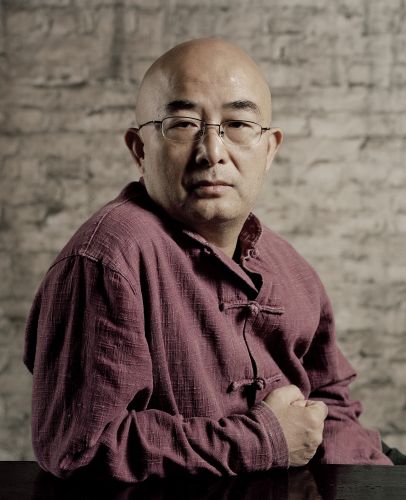Liao Yiwu was born in 1958 in China’s Sichuan Province. After secondary school he worked as a cook and a truck driver while intensively studying Western poetry and writing his first poems.In the 1980s he became one of China’s best-known young poets; however, after his work was published in underground literary journals, the authorities blacklisted him in 1987. Two years later, Liao wrote his poem »Massacre«, about the suppression of the popular uprising on Tiananmen Square. In 1990 he was sentenced to four years in prison for his film »Requiem« [1989], which was also about Tiananmen Square and was later reworked into the book »Testimonials or: For a Song and a Hundred Songs: A Poet’s Journey Through a Chinese Prison« [2000]. International pressure led to his early release, but after enduring psychological and physical violence during his imprisonment, Liao was socially isolated and ostracized. He reflects on his experience of being an outcast who is forced to move from one odd job to the next in »Interviews with People from the Bottom Rung of Society« [2001]. Originally published in China in a bowdlerized version and lauded as a »historical documentation of contemporary China«, it was ultimately banned. In 2002 an original edition was released in Taiwan; translations of the text, including those into French and English, won Liao international recognition.After years of being forbidden to travel abroad, he was allowed to participate in the 2010 internationales literaturfestival berlin. Only one year later, however, the authorities forbade him from reading or publishing his work internationally. In 2011 Liao escaped via Vietnam to Berlin, where he lives in exile. His 2011 book »God Is Red: The Secret Story of How Christianity Survived and Flourished in Communist China« gives a voice to a minority that has clung to its beliefs for many generations despite being repressed. The Nobel Peace Prize laureate Liu Xiaobo remarked that »Liao’s coverage of Christians allows truth to shine in the darkness. That’s the beauty of his writings.« Following his first novel »Die Wiedergeburt der Ameisen« [2016; tr: The Rebirth of the Ants], his most recent work, »Wuhan« [2022], is a documentary novel set in China that exposes the surveillance and control mechanisms with which the country has responded to the pandemic. Liao combines real documents and characters, such as the regime-critical reporter Kcriss, who was arrested in the process of investigating the origins of the coronavirus in Wuhan, with the fictional odyssey of a historian who sets off from Berlin on his journey home to Wuhan.The jury that awarded Liao the 2012 Peace Prize of the German Book Trade praised the author for waging »an eloquent and fearless battle against political repression« and erecting »an evocative literary monument to people living on the margins of Chinese society«.Date: 2022
Fräulein Hallo und der Bauernkaiser:
Chinas Gesellschaft von unten.
S. Fischer
Frankfurt a. M., 2009
[Ü: Hans Peter Hoffmann u. Brigitte Höhenrieder]
Mit einem Vorwort von Philipp Gourevitch, einer Einführung von Wen Huang und einem Nachwort von Detlev Claussen.
Für ein Lied und hundert Lieder
Ein Zeugenbericht aus chinesischen Gefängnissen
S. Fischer
Frankfurt a. M., 2011
[Ü: Hans Peter Hoffmann]
Erinnerung, bleib …
[Texte/Musik/Film]
[Begleittexte v. Herta Müller u. Susanne Messmer]
Lieblingsbuch/Fly Fast Publishing
Berlin, 2012
Die Dongdong-Tänzerin und der Sichuan-Koch
Geschichten aus der chinesischen Wirklichkeit
S. Fischer
Frankfurt a. M., 2013
[Ü: Hans Peter Hoffmann]
Gott ist rot
Geschichten aus dem Untergrund
Verfolgte Christen in China
S. Fischer
Frankfurt a. M., 2014
[Ü: Hans Peter Hoffmann]
Die Wiedergeburt der Ameisen
Roman
S. Fischer
Frankfurt a. M., 2016
[Ü: Karin Betz]
Herr Wang, der Mann, der vor den Panzern stand:
Texte aus der chinesischen Wirklichkeit.
S. Fischer
Frankfurt a. M., 2014
[Ü: Hans Peter Hoffmann]
Drei Wertlose Visa und Ein Toter Reisepass
Meine lange Flucht aus China
S. Fischer
Frankfurt a. M., 2018
[Ü: Hans Peter Hoffmann u. Brigitte Höhenrieder]
Wuhan
Dokumentarroman
S. Fischer
Frankfurt a. M., 2022
[Ü: Hans Peter Hoffmann u. Brigitte Höhenrieder]

